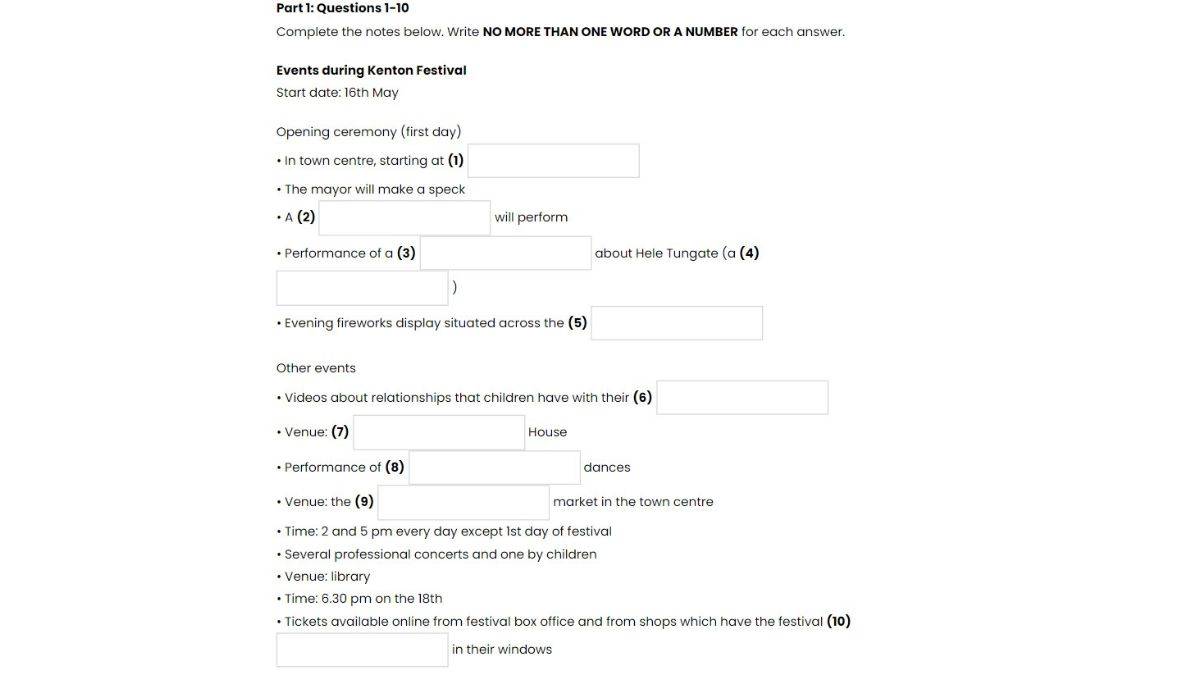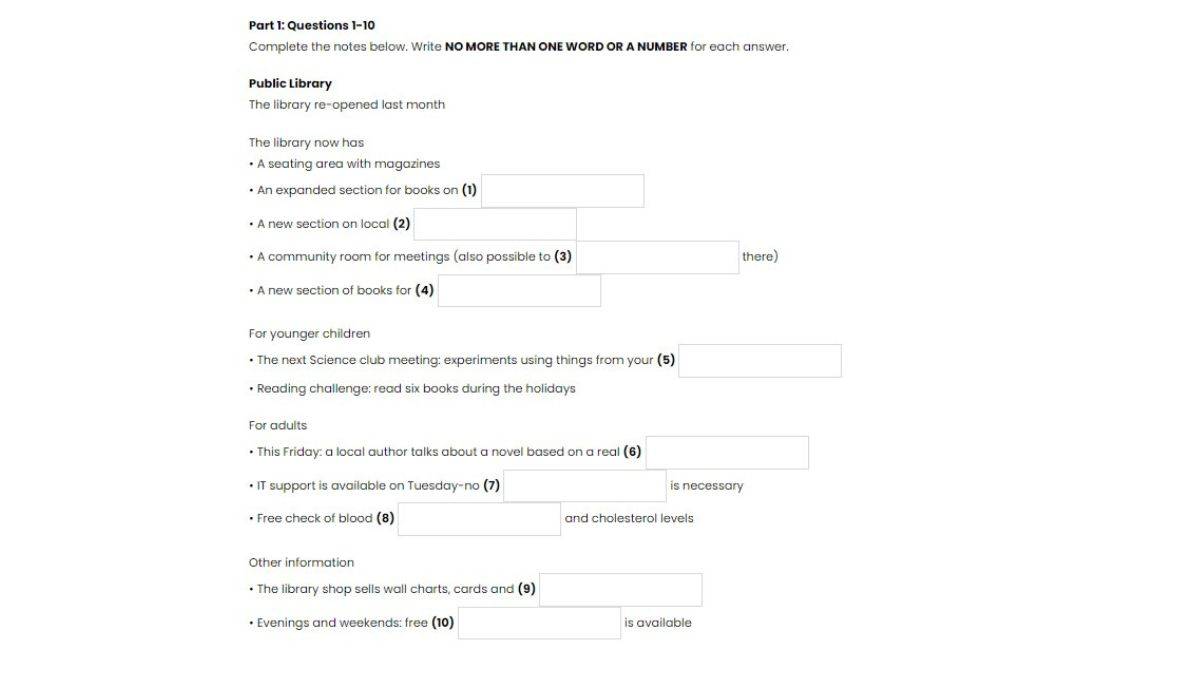The Note Completion task is one of the most common question types in the IELTS test. It evaluates your ability to accurately complete notes and retrieve important information from a recording. This article will help you understand the structure, difficulties, and strategies to succeed in the IELTS Listening section.
How to Ace IELTS Listening: Note-Completion Task
In this task, you’ll listen to an audio and fill in the blanks in the notes. The notes will include a summarised part of a lecture, a conversation, or an announcement. All you should know is as follows:
- Audio Context: Topics range from academic discussions to everyday situations like making hotel reservations or setting up a meeting.
- Note Style: Key elements are typically highlighted in bullet points or outlines.
- Word Limit: Be mindful of the allotted word count.
Predict your IELTS, TOEFL, and PTE in just 4 steps!
IELTS Listening Mock Test - Note Completion Task
Understanding the Note Completion Task - Sample Questions
Below are two note-completion questions taken from previous IELTS listening tests.
Sample Question 1 –
Source - Cambridge English test paper
The recording for the above sample question is regarding the several events and activities that are planned for the Kenton Festival. Participants inquire about specifics including event locations, schedules, ticket costs, and special features. Information on the various performances, workshops, food vendors, and cultural displays that will be accessible throughout the festival period is provided by the organizers.
Sample Question 2 –
Source - Cambridge English test paper
The recording for this sample question concerns Paul, who calls Susie, who works at a newly reopened library. They discuss the library's free membership, various facilities, including travel and history books, activities for children, adult events, IT support for seniors, and a free medical check-up service. Paul plans to join the library with his children and asks about parking, which is free in the evenings and weekends.
Steps to Master the Note-Completion Task
Refer to the below step-by-step guide to better understand how to answer the Note Completion task in the IELTS Listening section to a familiar topic: public libraries. This subject frequently involves discussions on events, facilities, membership information, and borrowing policies. Here is a step-by-step guide to help you approach it.
1. Analyze the Question Before Listening
Take a moment to read the notes and instructions.
Notes might include:
- Membership Fee: _______
- Borrowing Limit: _______
- Next Event: _______.
Example --If the blank says “Membership Fee,” you’re likely listening for a currency value, such as "10 pounds" or "free for students."
2. Listen Actively During the Recording
Focus on important details as the audio progresses. You can listen for:
- Cues like “the fee for adults is…” or “you’re allowed to borrow…” help pinpoint answers.
- Synonyms are often used: “No cost” for “free” or “loan duration” for “borrowing limit.”
Example --The recording might say: “The annual membership fee for adults is twenty pounds, while students don’t pay anything.” Here, the blank for Membership Fee should be "20 pounds" if adults are the focus.
3. Write Answers While Listening
Write your answers simulateously to avoid missing them. When the audio mentions multiple details, note them quickly. For example:
- “Adults pay 20 pounds, children pay 10, and students are free.”
If the blank specifies children's membership fee, ensure you write "10 pounds."
Example -- If the audio states, “The next event is the book fair, scheduled for 15th March,” the answer for Next Event would be “book fair” and “15th March.”
4. Manage Missed Information
It’s okay to miss some details when listening to a recording, Do not panic. Here;s what you can do:
- Move on to the next blank immediately. As the answers are in sequence
- Use context clues from the notes to write an answer later.
Example : If you miss “The borrowing limit is five books,” move on to the next blank about late fees. During review time, revisit your notes and guess based on common borrowing rules.
5. Review and Transfer Answers
After the recording ends, use the time wisely to review your work. You should check for:
- Spelling (“library” instead of “libary”).
- Word limits ("20 pounds" instead of "20 British pounds sterling" if two words are allowed).
- Grammar accuracy (“15th March” fits, but “15 Marchth” doesn’t).
Example -- When transferring the answer for Borrowing Limit, ensure it matches the singular or plural format of the blank (e.g., “5 books” or “five books”).
Common Challenges and Solutions in Note-Completion
The Note Completion task in IELTS Listening sometimes poses challenges with accuracy, focus, and comprehension. Your performance will significantly improve if you understand these difficulties and use practical solutions to overcome them. The following table lists the typical problems encountered when completing the Note Completion task, along with solutions to overcome them:
| Challenge | Description | Solution |
| Misinterpreting Word or Number Limits | Writing more words or numbers than allowed. | - Read instructions very carefully and highlight word/number limits. |
| Missing out important Details While Listening | Losing focus and skipping crucial information due to distractions or fast-paced audio. | - Stay attentive and follow the sequence of the blanks. |
| Spelling Mistakes | Incorrect spelling leads to a loss of marks, even if the answer is otherwise correct. | - Review common words and terms used in IELTS Listening. |
| Grammar Errors | Answers don’t fit grammatically within the sentence or context of the notes. | - Double-check grammar after writing on answer sheet. |
| Difficulty with Accents | Understanding various English accents (e.g., British, Australian, American) can be challenging. | - Practice with different listening materials to improve accent familiarity. - Listen to podcasts in different accents. |
| Not Following the Sequence of Answers | Answers appear in order in the recording, but some test-takers jump around, losing their place. | - Follow the blanks sequentially and refer to keywords in the notes to stay on track of the audio. |
Frequently Asked Questions
1. What is the Note Completion task in the IELTS Listening section?
The Note Completion task requires you to fill in missing information in notes, which summarizes key points from the audio recording. You will listen to the audio and write down specific details like numbers, dates, names, or concepts.
2. What types of recordings are used for Note Completion tasks?
The recordings can include conversations, lectures, monologues, or discussions on everyday or academic topics. The language used is conversational or formal, depending on the context.
3. How much time is given for the Note Completion task?
The listening recording is played only once, but you are given time before and after the audio to read instructions, skim the notes, and review your answers.
4. How do I know what type of information to listen for?
The notes and blanks will provide context. For example, if a blank is of “Phone number,” the answer is likely a number. Similarly, a blank after “due date” likely requires a date.
5. What does the instruction “Write NO MORE THAN TWO WORDS AND/OR A NUMBER” mean?
This instruction indicates that your answer should not exceed two words and/or one number. For example, if the answer is "20 dollars," writing "20 US dollars" would exceed the limit and answer will be marked wrong.
6. Can I write answers in all capital letters?
Yes, writing answers in all capital letters is acceptable and often recommended to avoid issues with capitalization errors.
7. What happens if I miss an answer during the recording?
If you miss an answer, don’t panic. Move on to the next blank to stay with the audio. You can make an educated guess during the review time, once the audio has played.
8. Do I lose marks for spelling mistakes in Note Completion tasks?
Yes, spelling mistakes will lead to a wrong answer, even if the information is correct. For instance, writing "comittee" instead of "committee" will lead to a deduction.
9. Can I use abbreviations in my answers?
Avoid using abbreviations unless specified in the notes. For example, write "kilometers" instead of "km," unless the abbreviation is part of the provided context.
10. How can I prepare effectively for the Note Completion task?
Practice listening to different types of recordings, focus on identifying key details, and develop your ability to predict answers based on the context of the notes.
- Universities in USA1038 Universities
- Universities in Canada174 Universities
- Universities in Australia633 Universities
- Universities in UK175 Universities
- Universities in Ireland32 Universities
- Universities in New Zealand70 Universities
Comments
(1289)
2 months ago
T
9 months ago
R
9 months ago
R
a year ago
M
a year ago
R
a year ago
Hello Mustafijur. If you are looking for assistance with applying to universities abroad. Get in touch with our Shiksha Study Abroad Counsellors and book a counselling session absolutely free, Click Here
a year ago
R
a year ago




